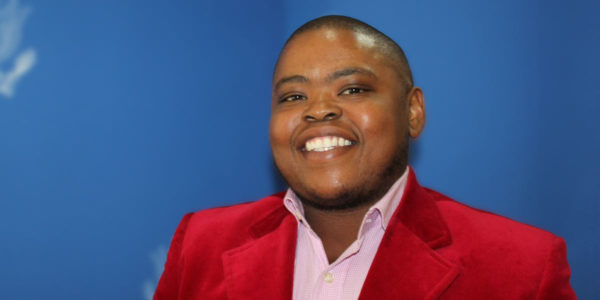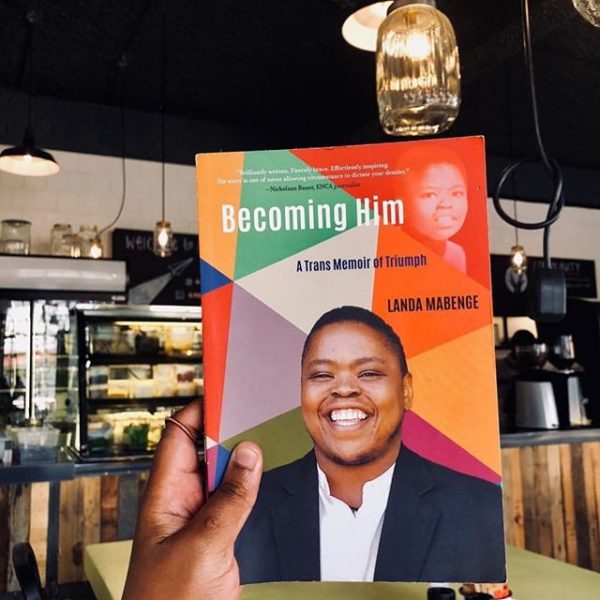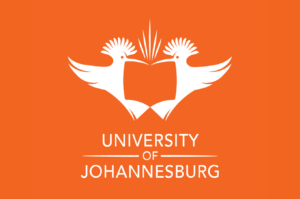
Landa Mabenge‘s debut memoir Becoming Him: A Trans Memoir of Triumph details his journey from being born in the body of a girl, the difficulties he experienced as a child, to his embrace of his identity in university, his transitioning, in the course of which he became the first transgender man in South Africa to make a medical aid pay for his surgeries. Published by MFBooks in August 2018, Becoming Him was written under the mentorship of best-selling author and publisher Melinda Ferguson. Currently longlisted for Sunday Times’ 2019 Alan Paton Award for nonfiction, the book has been selected for its libraries by the South African province KwaZulu-Natal’s Department of Arts and Culture.
Mabenge’s experience has pushed him to work for the rights of transgender South Africans. In 2016, he founded Landa Mabenge Consulting, which works primarily with the Stellenbosch University Equality Unit “to create access to education and awareness as well as linkages to care for transgender students.” The 28-year-old speaker and facilitator, who regularly engages with the Transgender Clinic to develop tools and strategies to extend awareness to the private sector, was part of a 2017 symposium looking to amend the country’s basic education curriculum to include gender identity and sexual orientation in schools as part of life orientation. For his work as an educationalist and consultant, he was selected in 2017 for the Mandela Washington Fellowship for Young African Leaders, and this year as a 2019 Global Innovator by the American organisation Human Rights Campaign (HRC).
_______________________________________________________________________

Here is a description of the book in Mabenge’s words on MFBooks’ site:
Landa Mabenge is born in April 1981. He comes into this world trapped in a girl’s body, and is christened Yolanda, after the American gospel singer. At just two days old, Yolanda’s biological mother rejects her ‘daughter’ and hands the infant to her sister, who immediately becomes ‘Ma’.
From an early age Yolanda is aware that she does not fit into her body. Why does she not have a penis like her boy cousins? Why does she have to wear dresses when all she wants is to wear trousers and shorts like all the other boys? Why does she feel excited when she is close to her girl cousin? Despite her feelings of disjuncture, she spends the next decade happily growing up in Umtata with Ma and her grandparents, oblivious of her true parentage.
At age 11 Yolanda’s world is shattered when an angry woman and her zombie-like husband unexpectedly arrive in Umtata to force Yolanda to accompany them to Port Elizabeth. She temporarily escapes relocating but soon discovers that her beloved ‘Ma’ is not her biological mother and that the PE couple are in fact her real parents. The following year she is taken by Ma to permanently live with the new family in Port Elizabeth. Life in PE with her new ‘parents’ soon morphs into a Dickensian nightmare. Uprooted from a stable and loving home in Umtata, where she was accepted for who she was, she is now subjected to horrific physical, emotional and psychological abuse.
When she gets her period a few months later, terrified that she might be dying or that her body is preparing itself to grow a penis, she hides the evidence from her new mother for days. On discovering her daughter’s secret, the Mother’s disgust drives Yolanda further into a world of isolation and shame.
In her final year of school, with sterling grades, she is accepted at UCT to study law. Out of PE and now in Cape Town, Yolanda ditches her girl clothes and name and begins a new life as Landa, a butch lesbian. But the harassment from her mother continues by way of phone calls accusing her of being a whore, of sleeping around and of having AIDS. Landa begins isolating herself and drinking heavily. She starts attending sessions through UCT counselling services, with therapist Birgit Schreiber, a woman who will play a pivotal role in her transformation. By the end of the year she suffers a total breakdown. Plagued by her years of abuse and the curse of being in the wrong body, she attempts to take her life by slitting her wrists. She is sent to Kenilworth Clinic for a two-week period of intensive therapy and then back to Umtata to Ma, to recover. She now switches her studies to a commerce degree. She is finally disowned by her biological mother, which paves the way for Yolanda to shift out of the identity that has held her hostage and now embrace becoming Landa. She has become he. When Landa’s biological parents pass on in 2008/2009, he begins intensive research around what it will entail to embark on gender realignment.
The next few years see Landa undertake a mammoth mission to transition. In 2009 he enrolls as a patient at the Groote Schuur Transgender Clinic and is approved for hormone replacement therapy in the form of testosterone injections. A year later, Landa applies to Home Affairs to legally change his name from Yolanda to Landa and, a few months later, successfully changes his gender in the Births and Deaths Register from female to male.
The next stage of Landa’s journey involves applying to his medical aid to fund his prohibitively exorbitant ‘gender affirming’ surgeries. This proves to be a three-year-long battle. In 2014, after a lengthy process of countless motivations, applications and meetings, Landa finally finds a medical scheme that agrees to pay for his surgeries: a double mastectomy and a laparoscopic hysterectomy. Landa makes history by becoming the first transgender man in South Africa to successfully force a medical aid to pay for his surgeries.
He is unable to do penile surgery at the time, due to exorbitant cost constraints. Landa is currently saving towards the operation, which he hopes to undergo in 2019. Today, Landa lives a transformed and happy life as a transgender activist and consultant. One of his favourite quotes comes from the book Charlotte’s Web: ‘We’re born, we live a little while, we die.’
________________________________________________________________________
In May, Mabenge was in conversation with The Cheeky Natives at the Kingsmead Book Fair.
In a conversation with MambaOnline, he says:
It is beneficial to always remember that this is a journey; it has a lot of ups and downs, and at times can be extremely lonely and isolating. It is important to reach out to people and spaces that can provide some measure of support. There are a lot of organisations that are doing amazing work in the transgender space and have safe spaces where people can come together to chat and share strategies and more about their lives. Social media has made it possible for easier linkages and trans folk can use these to connect to these organisations and safe spaces and people. Most importantly, be kind and patient with the self and choose to be around people who see and receive you for the beauty you truly are.
Landa Mabenge’s courage and will are inspirational.
BUY Becoming Him: A Trans Memoir of Triumph on Jacana or Amazon.









COMMENTS -
Reader Interactions